This year, much of ‘Detty December’ may be fuelled by an unlikely source—growing apathy towards COVID-19.
In major cities like Lagos and Abuja, Nigerians have been celebrating ‘Detty December’, a term that has come to represent the busier-than-usual nature of the festive period, the seasonal surge in local activities and the rise in local consumption and spending driven by Nigeria’s returnees. This year, much of ‘Detty December’ may be fuelled by an unlikely source—growing apathy towards COVID-19.
On 22 December 2021, the Nigeria Centre for Disease Control (NCDC) reported 4,035 COVID-19 infections—the highest number of daily COVID-19 cases recorded in Nigeria since February 2021. Lagos State alone accounted for around 84 per cent of these infections. In comparison, on 21 December, Nigeria had recorded total of around 2,859 cases nationwide.
‘Once inside the event venues, people tend to remove their masks in order to enjoy the show and communicate.’
Oluwasegun Onakoya, an event manager based in Lagos, told The Republic that while there are COVID-19 guidelines for attending large public events including concerts, the guidelines tend to be only effective at venue entrances. According to Onakoya, ‘COVID-19 compliance at events has increased, especially with the Lagos State government asking for vaccination cards to be presented before entering events. This has made more people mask up and more careful about their environment and self-awareness.’ However, Onakoya explained, ‘once inside the event venues, people tend to remove their masks in order to enjoy the show and communicate.’
The concert goers we spoke to were even more ambivalent about COVID-19:
‘2021 has been quite the year. With the year we had in 2020 (series of lockdowns, COVID related casualties, border closures, travel bans and event cancellations) it was only expected that people would go all out once there was some semblance of normal. I decided I was going to attend concerts this year primarily because I hadn’t been to one in a while. I was just particular about attending Oxlade’s event here in Lagos. I’m not one to take chances, I had to stay masked up all through the concert. Though I can’t say the same for most of the attendees.’ — Abdullahi Fawale, 26, Lagos
‘I was at the Wizkid concert in Abuja, and even though I was not particularly concerned about COVID-19, I had my mask on for the most part. I think people are tired of COVID-19 protocols. There’s also the fact that the mortality rate from COVID is relatively lower here. Very little can come between Nigerians and Detty December. I know people who are prepared to risk it all for a chance at a good time. COVID was the last thing on my mind while I was waiting out in the cold by 3 a.m. for Wizkid to show up.’ — Chijioke Osuji, late 20s, Abuja
‘I’ve attended two concerts. One because I got free VIP ticket which meant I wouldn’t be in the crowd. I had no plans to, and got tickets to go last minute. I’ve taken both vaccine doses and will get a booster jab soon, so I thought it wouldn’t hit me so hard if it did. Also, I live alone, won’t expose anyone, and I had a mask on the entire time and stayed away from the crowd. Some attendees weren’t putting on a mask and the MCs always interrupted the events to ask people to keep their mask on.’ — Rose Ezeh, 22, Lagos
‘I know people who are prepared to risk it all for a chance at a good time.’
A concert goer we contacted told us, ‘I have the flu’, and refused to provide further comments. Several Nigerians have also reported flu-like symptoms on social media with many thinking they might have COVID-19 despite testing negative. While more information about the new variant is still developing, experts believe mild omicron cases could feel like regular flus with symptoms including runny nose, fatigue and sneezing.
According to minister of information and culture, Lai Mohammed, only about three per cent of Nigeria’s 206 million people are vaccinated leaving over 200 million Nigerians unvaccinated. Djaji, a 25-year-old musician in Lagos, explained he was unvaccinated because of his age. ‘I initially decided not to take the vaccine as I assumed I would fall ill for a day, and didn’t want to miss work,’ he said. ‘The main reason though is because I’m not within the age range of COVID being deadly for me, it is more important for the elderly and people with pre-existing conditions to take the vaccine.’
Is apathy towards COVID-19 inevitable in Nigeria?
COVID-related research and vaccine distribution continues to overlook African countries; with low vaccination rates and rising economic pressures in Nigeria, fear of income losses could be overshadowing COVID-related health concerns. ‘We can’t expect life to not continue as normal,’ Djaji said. ‘I also believe that the pandemic has affected regions of the world differently, and more localized analysis of the disease is needed for us to understand who is most at risk and where.’ Until then, he explained, ‘I’d recommend we all remain cautious and continue wearing masks and being hygienic by washing hands regularly and isolate should we have any symptoms.’⎈
The views, thoughts, and opinions published in The Republic belong solely to the author and are not necessarily the views of The Republic or its editors. We want to hear what you think about this article. Submit a letter to the editors by writing to [email protected].



